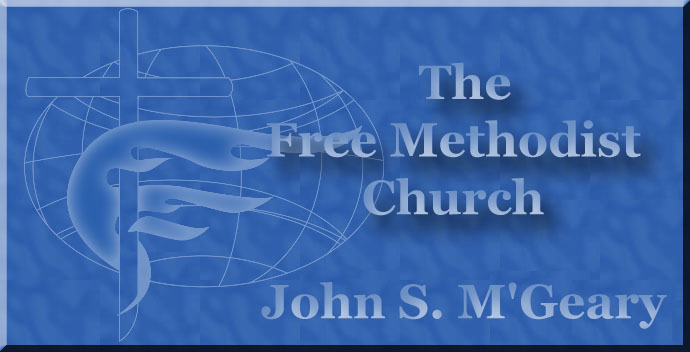
The Free Methodist Church
By John S. M'Geary
Chapter 1
INTRODUCTORYFrequently the organization of a new denomination grows out of the fact that some have become dissatisfied with the doctrinal statements, governmental policy or some other feature of a particular ecclesiastical body and because of this have seceded and formed another church more in harmony with their own views. The Free Methodist church does not owe its existence either to a schism or a secession. All the men who were most prominently identified with the organization of the church were formerly either ministers or laymen in the Methodist Episcopal church, but they never attacked either the doctrines or the polity of that church. They did protest against what to them appeared to be grievous abuses of the powers conferred by the Discipline of the church upon them, by various officials and official bodies of that church. They were not schismatic. They did not seek to foist upon the church any peculiar doctrinal notions or practical precepts or introduce any practices of their own invention. They loyally and faithfully preached the doctrines of Methodism as they found them laid down in the standards of the church; they sought diligently and earnestly to lead men into the type of spiritual experience which for many years it had been the glory of Methodism to offer them; they endeavored to enforce Methodist discipline. All these things, at their ordination as Methodist preachers, they had solemnly covenanted to do. They believed certain doctrines fundamental to Methodism were being almost entirely neglected and set aside by the majority of Methodist preachers. These they sought to revive and restore to their proper position and prominence in their ministry. The church was departing from the primitive simplicity and power of Methodism and they did seek to recall those under their ministry to the “old paths” in which the church had walked while gaining her splendid victories. Their labor was not in vain. Revival fires were kindled wherever they went, sinners were saved and believers were entirely sanctified. But opposition developed, not from without as heretofore, but from within. A strong party opposed to the distinctive doctrines and practices of Methodism had grown up in the church. This party had control of the machinery of the church. The inevitable followed. It was simply a renewal of the old conflict between truth and error, between spiritual life and spiritual death. The two opposite elements could not flourish side by side. In the end one or the other must go down. The party controlling the machinery of the church made use of their power to crush out the spiritual movement. The leaders, both ministers and laymen, were remorselessly proscribed and thrust out by an arbitrary exercise of ecclesiastical power unparalleled in the annals of modern church history. Because they were true to their vows as Methodists and Methodist ministers they suffered the loss of all things. Hundreds of them unjustly and unceremoniously thrown out of the church of their choice where they had expected to spend their lives, were obliged to do something to save themselves and conserve the work God had given into their hands. After mature deliberation they organized the Free Methodist church. Modeling, as was natural, their new home somewhat after the style of the old
one which they had loved so well and from which they had been so unrighteously
thrust out, they committed their cause to God and went about the work they felt
He had given into their hands. The issue has proved that they were not mistaken
in their convictions and that they did not build in vain. The work has spread
over a large part of the United States, across the border into Canada and to the
distant lands of heathen darkness. Consecrated men and women have been raised up
whose watchword is:
|
||
 |
 |
|
|
|
||
-
Site Navigation
 Home
Home What's New
What's New Bible
Bible Photos
Photos Hiking
Hiking E-Books
E-Books Genealogy
Genealogy Profile
Free Plug-ins You May Need
Profile
Free Plug-ins You May Need
 Get Java
Get Java.png) Get Flash
Get Flash Get 7-Zip
Get 7-Zip Get Acrobat Reader
Get Acrobat Reader Get TheWORD
Get TheWORD